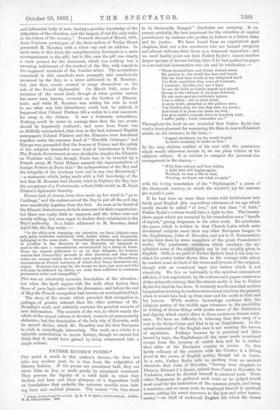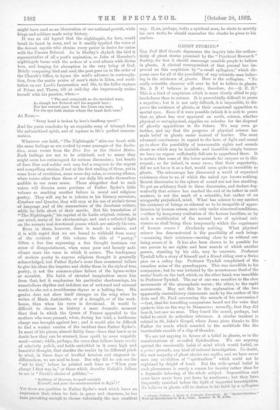FATHER RYDER'S POEMS.*
ONE point is much in this author's favour,—he does not echo any modern poet, be is free from the vulgarities of literary fashion. If hie poems are sometimes bald, they are never false ;in key, or made gaudy by misplaced ornament They possess the dignity of a solid faith in what they declare, and here and there glimpses of a dogmatism built on foundations that underlie the universe ennoble even halt- ing lines and crabbed phrases. The sonnet "On One about * Poems, 01 ioioal anti Trantlated. By II. '. D. Ryder. of the Oratory. Dnblin: IL H. Gill scd Sons. 1881
to be Deservedly Hanged." illustrates our meaning. It ex- presses probably the best argument for the retention of capital punishment by nations who profess to believe in a future state and its justice. We have heard from an experienced gaol chaplain, that not a few murderers who are hanged recognise and almost welcome their doom as a temporal reparation ; and we need hardly point out that Father Ryder's sonnet touches deeper springs of human feeling, than if he had gushed for pages in conventional lamentation over sin and its retribution
Whole.hearted hate and dainty distant scorn My portion is : the world has seen and heard. Bat one kind face would at my whispered word Yet flush conviction they were all forsworn, I innocent; for this, too, was I born, To see the faith no hostile breath had stirred, Strong in the sickness of its hope deferred, By one mute gesture ruthlessly uptorn. I am a villain : this is utter truth,
A sorry truth, preached at the gallows tree; Yet kindlier than the lies that slew my youth; And truth it is alone can make me free, Can give earth's outcast share in heavenly ruth. I suffer justly ; Lord, remember me !"
Throughout the book we are reminded that Father *der has used a truer plummet for measuring life than do less well-trained minds, as, for instance, in the lines,—
" August obedience, by the world denied, Is God's economy to make us free."
In the very obvious conflict of his soul with the pessimism which would otherwise invade it, we see plain tokens of his religious culture. It is curious to compare the personal dis. conragement in the stanza,— " With foes without and foes within, A fight that still begins again, Worsted, we lose a life in vain, Winning, we know not what we gain," with the loving translation of the "Nightingale," a poem of the thirteenth century, in which the mystic's joy far outruns the mystic's pain.
If he had done no more than render with faithfulness into fairly good English this marvellous utterance of an age which surely should be called "of love," not less than "of faith," Father Ryder's volume would have a right to live. The twenty- three pages which are occupied by his translation are a "bundle of myrrh," giving fragrance to his other work. He attributes the poem, which is written in that Church Latin which suits devotidnal subjects more than any other European tongue, to the Englishman, John of Hoveden, and not to S. Bonaventure, as has been done by some compilers of the great Franciscan's works. The passionate sweetness which emulates the un- syllabled notes of the nightingale can be but roughly given in English. Still, in no part of Father Ryder's book is his true in-. stinct for poetry better shown than in the courage with which he renders some at least of the stress and fervour of the original, though with an occasional lapse into bathos which is not simplicity. We live so habitually in the spiritual atmosphere affected, if not engendered, by the schisms and pagan renascence of the sixteenth century, that the utmost credit is due to Father Ryder for what he has done. It certainly would seem that modern imagination working in Modern verse cannot rise from the ground, when it would fain look up from man and his earth to God and his heaven. While modern hymnology confirms this, the religious poetry of the middle ages witnesses to the possibility of writing of divine things with poetic sense of the distinction and dignity which man's share in them confers on human exist- ence. We have no difficulty in believing that this song of a soul to its divine Cause and End is by an Englishman. In the mixed materials of the English race is not wanting the leaven, of mysticism. Perhaps because he is practical and little bound by logic, the Englishman all the more needs occasional escape from the tyranny of visible fact, and he is readier than other of his European cousins to revere. So this levely colloquy of the creature with the Creator is a fitting jewel in the crown of English poetry, though set in Latin.. In a note, Father Ryder tells us, quoting from an ancient chronicle, that John of Hoveden, "having been chaplain to Eleanor, Edward L's Queen, retired from Court to Hoveden, in, Yorkshire, where he devoted himself to pastoral work. From either Testament he gathered such texts as he judged would most avail for the instruction of the common people, and being a musician, and no mean poet, he employed himself in spiritual verses, setting his sweet measures to the lyre and other instru- ments,"—an idyll of medireval English life which Mr. Green might have used as an illustration of our national growth, while kings and soldiers made noisy history.
It was an old legend that the nightingale, for love, would break its heart in song, and so it readily typified the voice of the devout mystic who strains every power in desire for union with the Unseen Beloved. As in Shelley's skylark the bird is representative of all a poet's aspiration, so John of Hoveden's nightingale burns with the ardour of a soul aflame with divine love, and longing for absorption in the very being of God. Briefly comparing bird and soul, the poet goes on in the order of the Church's Office, to hymn the soul's advance in contempla- tion, from the matin praise of man's state in Eden, and medi-
tation on our Lord's Incarnation and life, to the fuller rapture of Prime and Tierce, till at mid-day she impetuously unites herself with his passion, when,— CC The soul remaineth as she ravished were, As though her Beloved still his anguish bare ; Nor her earnest gaze from the Cross can tear, • For the eye bath station where the heart bath care."
At None,— " Every bond is broken by love's headlong speed."
,A.nd the poem concludes by an exquisite song of triumph from the enfranchised spirit, and of rapture in life's perfect consum- mation.
Whatever our faith, " The Nightingale " stirs our heart with the same feelings as are evoked by some passages of the Imita- tion, some verses from the Dies .Tree or the Btabat Mater.
Such feelings are not to be criticised, and to many they might seem too extravagant for serious discussion ; but hearts of finer fibre and nobler sort may feel a response to the urgent • and compelling strains, if not at the first reading of them, yet in some hour of revelation, some noon-day calm, or evening silence, when voices other than those of our daily life make themselves audible to our inner sense. Those altogether deaf to such voices will dismiss some portions of Father Ryder's little volume as marking another failure in moral and religious
,poetry. . They will say he is inferior to his literary ancestors, Crashaw and Quarles, they will carp at his use of archaic turns of language and of the mannerisms of the Jacobean writers, while he falls short of their merits. But his translation of "The Nightingale," his reprint of its Latin original, redeem, in our mind, many of his shortcomings, and cast a reflected light
on the sonnets and devotional poems which are entirely his own. Even in these, however, there is much to admire, and
it is with regret that we are bound to withhold from many of the contents of this volume the title of " poetry." Often a fine line expressing a fine thought increases our sense of disappointment, when some poor and homely anti- climax mars the verse in which it occurs. The inadequacy of modern poetry to express religious thought is generally
acknowledged, but Father Ryder's more than occasional failure to give his ideas the impetus and clothe them in the style of true, poetry, is not the common-place failure of the hymn-writer or moralist. His habit of elevated imagination saves him from that, but it emphasises his particular shortcomings, his onmelodious rhythm and indolent use of awkward and unusual words to eke out a troublesome rhyme or a halting line. His genius does not show itself stronger on the wing when he writes of Marie Antoinette, or of a drought, or of the work- house, than when his verse is devotional. It would be difficult to choose in history a more dramatic- moment than that in which the Queen of France appealed to the mothers who were present, when, during her trial, a loathsome charge was brought against her ; and it would also be difficult to find a weaker version of the incident than Father Ryder's. In most of his pieces, almost flabby lines—lines that leave us in doubt how they can be scanned, lines spoilt by some ungainly word—occur; while, perhaps, the verse that follows bears marks of scholarly polish, and holds embedded in it some high and beautiful thought, that startles the reader by its different pitch to what, in these days of levelled heroism and. stagnant in- differentism, we are used to hear. But why did he not use the "art to blot," before he printed such lines as " When your charge I first was in," or those which describe oliah's failure to see in "David's choice of pebbles,"—
" Artillery of Heaven, to quell outright
Himself, and pour the uncircumcised in flight P"
Yet there are qualities in Father Ryder's work which leave an impression that, when he fails in grace and clearness, he has
been provoking enough to choose voluntarily the less excellent
way. If, as, perhaps, befits a spiritual man, he elects to mortify his own taste, he should remember the shocks he gives to his readers.



































 Previous page
Previous page